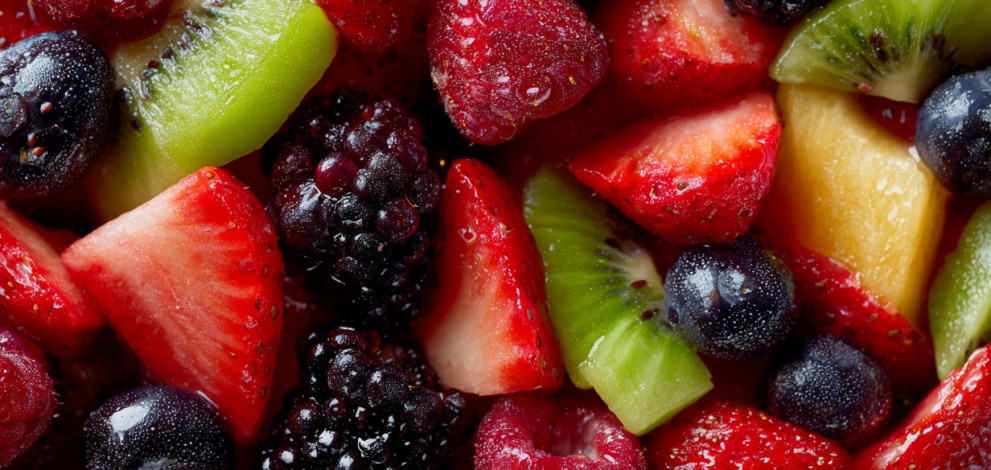Berries vs fruits: Which is the best option for breakfast
Choosing the perfect breakfast food often feels like a small decision – but given its effects on your energy, digestion, and long-term health, it indeed is a significant decision, especially when breakfast has been touted as the most important meal of the day by several health experts. It’s only natural that we should make sure to choose the best of both worlds: health and taste! Now, when it comes to breakfast, a bowl of assorted veggies and fruits is our best choice: fresh, colorful, naturally sweet and appeasing, and generally healthy! While we tend to put our veggies into smoothies to make them more palatable, for the fruits, we often prefer to have them freshly cut and served.
Fruits, after all, are a key element in a healthy diet that promotes overall wellness. They offer numerous health benefits, including reducing the risk of chronic diseases like heart disease and diabetes, improving digestion, and providing essential vitamins and minerals. They are a good source of fiber, antioxidants, and phytonutrients, all of which contribute to overall well-being. But in recent years, one subgroup of fruits — berries — has been elevated to near-superfood status by dietitians, nutritionists, and health experts. And along with that knowledge comes the comparison: Are berries better than other fruits?
Here, let’s dig into the science behind berries and fruits, compare their nutritional profiles, and examine how they behave in a breakfast setting — from energy, digestion, blood sugar, and satiety to antioxidant power.
Berries vs fruits: Which is the best for breakfast?
Firstly, it’s important to realize that berries are, after all, fruits, and fruits as a group bring many essential benefits. Fruits supply fiber, vitamins (especially vitamin C and folate), minerals, antioxidants, and water, while generally being low in fat and sodium. Dietary fiber from fruits helps with digestion, supports gut health, reduces cholesterol absorption, and can help with weight control. Numerous studies link higher fruit and vegetable intake with lower risks of heart disease, stroke, and certain cancers. So the base case scenario here is crystal clear: having fruit at breakfast is a smart move.
But not all fruits are created equal in how they affect your morning energy, blood sugar, and fullness. That’s where berries tend to stand out.
What makes berries special
Now, this question isn’t just about taste or variety; it’s about how your body handles sugars, fiber, nutrients, and digestion in the early hours.
What’s more? New research suggests that berries are packed with plant compounds like anthocyanins, ellagic acid, resveratrol, and flavonoids — many of which give berries their vivid reds, blues, and purples. These compounds help neutralize free radicals, reduce oxidative stress, and may lower inflammation — a key factor in chronic diseases. Swapping even one serving of “common fruit” with berries can meaningfully boost your intake of beneficial compounds like anthocyanins and fiber, without drastically increasing calories.
Additionally, compared to many fruits, berries tend to have lower natural sugar content per serving than some tropical or high-sugar fruits, which helps maintain blood sugar stability. Their fiber also slows digestion, increases fullness, and can reduce the rapid spike-crash effect of high-glycemic foods. Furthermore, berries punch above their weight. For example, a cup of strawberries often covers over 100% of daily vitamin C needs, while remaining low in calories.
Harvard researchers have linked higher berry consumption to lower risk of type 2 diabetes, weight gain, and improved cognitive aging. Even frozen berries retain most of their antioxidants and vitamins, making them a reliable year-round option.
Where other fruits still manage to shine
Although berries tend to claim superiority, large tropical or “sweet fruits” like bananas, mangoes, grapes, pineapples, oranges, and apples bring their own advantages:
Higher calorie yield and natural sugars: If you need quick energy (e.g., after early morning workouts), fruits with more natural sugars can be beneficial.
Distinct vitamins and minerals: For example, citrus fruits are strong in vitamin C and certain flavonoids; kiwi provides vitamin K and actinidin (a digestion-related enzyme).
Taste variety: The different sweetness, texture, and flavors make breakfasts more appealing and prevent flavor fatigue.
Greater bulk: Some fruits provide more volume per serving, which can help with satiety depending on what you combine them with.
Thus, while berries often outperform many fruits in “health-per-calorie” metrics, other fruits are not to be dismissed.
Berries or fruits: Best breakfast performance
When you eat fruit (or berries) at breakfast, several factors matter:
Satiety or fullness: Berries’ higher fiber-to-sugar ratio helps them keep you feeling full longer, which reduces mid-morning snacking.
Blood sugar control: Berries are gentler on your sugar levels thanks to fiber and lower glycemic impact.
Digestive ease: Fruits with high water and fiber content (berries included) help maintain smooth digestion.
If forced to pick one best option for breakfast, many dietitians would lean toward berries because of their superior sugar-to-fiber ratio, high antioxidant content, and favorable impact on blood sugar and inflammation.
The “ideal” breakfast bowl
In a “berries vs fruits” face-off for breakfast, berries often come out ahead in terms of antioxidant density, fiber-to-sugar ratio, blood sugar friendliness, and satiety. But that doesn’t mean other fruits are obsolete. The “ideal” breakfast is a balanced mix of fruits (including berries), protein, and healthy fats.
However, it’s important to remember that neither fruit nor berries alone will make a complete meal. Pairing them with protein (e.g., yogurt, eggs, nut butter) and healthy fats helps stabilize energy, slow digestion, and provide essential amino acids.
So, combine berries and other fruits to get a broader spectrum of nutrients (e.g., berries and banana, or mango and raspberries). Rotate varieties by using strawberries, blueberries, raspberries, blackberries, kiwi, citrus, and mango, as diversity ensures you get a range of vitamins and compounds.
Remember, frozen berries retain much of their nutrition, like anthocyanins, fiber, etc, and are often cheaper off-season. But be cautious with juices or dried fruits. Juicing them strips much of the fiber and can lead to sugar spikes, while the whole fruit or berries are disproportionately better choices.


